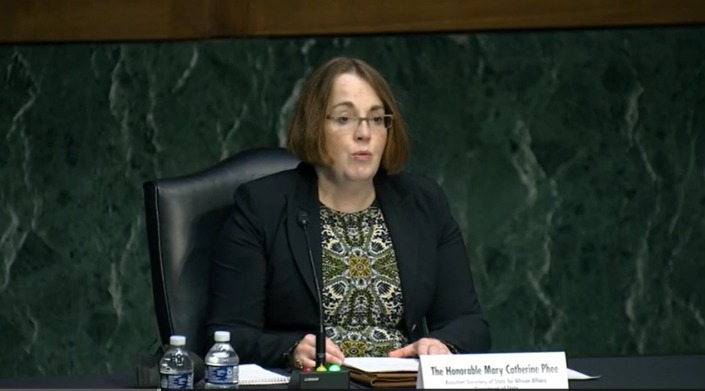There is a room for diplomatic solution in Sudan, says U.S. Phee
February 1, 2022 (KHARTOUM) – The situation in Sudan makes it possible to reach a diplomatic solution for the Sudanese crisis and bring the military to restore democratic transition said U.S. Assistant Secretary of State for African Affairs Molly Phee on Tuesday.
The U.S. Senate Foreign Relations Committee held a hearing on U.S. Policy in the Wake of the October 25th Coup in Sudan where they expressed they expressed their frustration and disappointment for the lack of strong measures against the Sudanese military.
In her testimony before the Senate, Phee explained that they paused economic assistance. Also, they are preparing new measures aiming to reduce funds available to the Sudanese military including targeting the military-controlled companies and sanctioning those who deal with them.
However, Democratic Senator Bob Mendez, the committee’s chairman, and Senator Jim Risch, the panel’s top Republican, criticized this soft approach.
Mendez went further to speak about the “failure” of the Biden administration to deal with the Sudanese military and called for targeted individual sanctions.
In her response to similar criticism from Senator Risch, the US. top diplomat for Africa stated she believes that the current conditions in Sudan still allow to smartly bring back the democratic transition in Sudan
She first pointed to the determination of the Sudanese people to resist the coup and re-establish democratic rule in their country.
“I haven’t seen that kind of strength and cohesion in other different environments in which I worked,” Phee said.
After that, she pointed to the military forces in Sudan saying they are not “monolithic”.
“Some of them truly would like to effect the transition but they do not know how to do it,” she added.
“I think really there is an opportunity for diplomacy here,” she stressed.
The diplomat, in addition, mentioned the unprecedented regional and international support for the Sudanese in their quest for democracy.
“I believe that this strength we haven’t seen in other environments”.
“We need to continue to support them. It is not frankly surprising that this transition is difficult. We need to have an approach that can absorb shocks that would be inevitable and continue to put pressure on and continue to provide that kind of technical assistance,” she concluded.
(ST)

